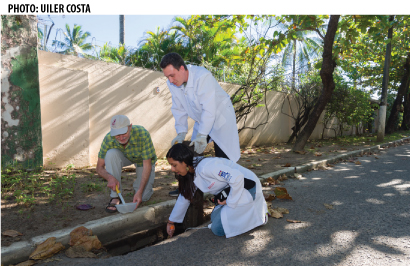
A simple action could prevent the Aedes aegypti breeding
The study shows how a small intervention could mean an important reduction of rainfall water accumulation and, consequently, affect the mosquitoes larvae proliferation
13/08/2017
The results are very important for drawing attention to the need of restructuring the arboviral diseases prevention and control programs
A study conducted by Fiocruz-Bahia researcher and professor the Collective Health Institute from the Bahia Federal University (ISC/UFBA), epidemiologist physician Dr. Guilherme Ribeiro, published in the international journal Parasites & Vectors, in 2016, showed that the street draining holes, also known as manholes, when accumulate still water are potential focuses for the Aedes aegypti, the dengue, zika and chikungunya transmitting mosquito. In this in loco study, researchers also found the Aedes albopictus. The same journal published a second paper by Dr. Ribeiro in last April showing the effects of an intervention in public draining systems over water buildup and Aedes aegypti reproduction.
During the first study, we performed a survey in four places in Salvador. Residents from one of these areas organized and performed an intervention in the manholes. After this action, our team decided to evaluate the effects of the changes by comparing data from before and after the intervention. The results of this assessment were recently published, explains Dr. Ribeiro. The intervention consisted in placing concrete in the lower part in order to raise the base until the exit tube level, avoiding water buildup. They also placed a metal mesh covering the exit tube in order to avoid clogging with garbage.
The researcher believes it is possible that other areas in Salvador, or even in Brazil, could benefit from the intervention described in the study. It is worth stating that draining structures are designed and installed by urban engineering teams. Joining efforts from the health sector to the sanitary engineers is fundamental for a large scale evaluation of these draining structures and designing and applying a simple and effective intervention able to stop water buildup in the draining systems, he argues. Still according to the expert, facing the arboviral diseases problem must involve multi-sector actions and not focus in the health field and vector control actions. It is necessary to join several fronts as, for example, urban planning offices and public areas maintenance teams, water supply companies, sewer collection and treatment companies, urban cleaning, among others. Enhancing these services is fundamental for us to reduce the impact of arboviral diseases in public health, he adds.
The results are very relevant for drawing attention to the need to restructure arboviral diseases control and prevention programs, since the main actions assume the breeding sites of the zika, dengue and chikungunya transmitting mosquitoes are in the households and not in public environments. According to the authors, Aedes combat campaigns are directed to breeding sites in households, neglecting potential sites in public spaces.
The study shows how a simple intervention could mean an important reduction in still water retention and, consequently, affect the mosquitoes larvae proliferation. The researcher stresses that controlling mosquitoes from the Aedes genus has been a great challenge in the whole world. This way, we hope this papers disclosure could spread this experience, in the Country and abroad, emphasizing the need to apply alternative but effective ways to eliminate potential breeding sites for the mosquitoes, he finishes.…










